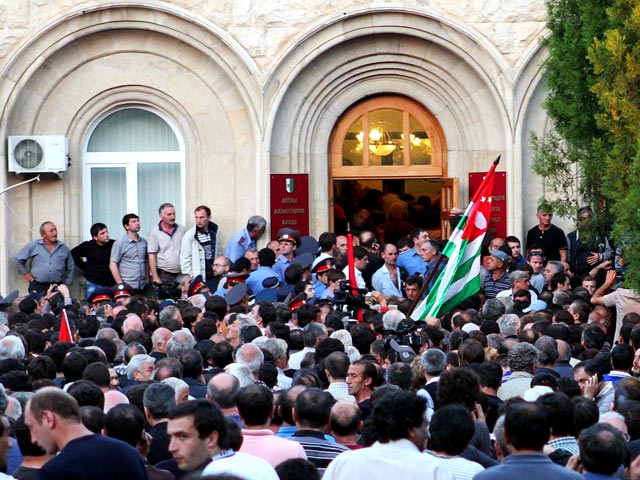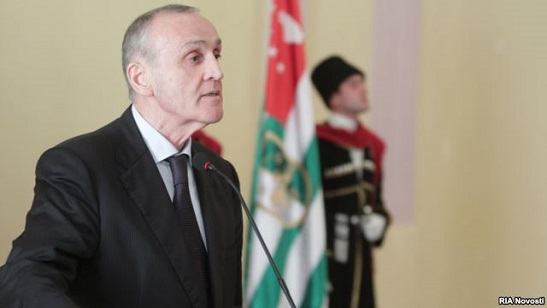Political crisis in Abkhazia, as opposition rallies

The leader of Abhkazia, Georgia’s breakaway region, was forced to flee the capital Sukhumi after opposition protestors stormed the presidency in Abkhazia.
The opposition are demanding the resignation of Abkhazian President Alexander Ankvab, AFP said today based on Russian media reports.
The leader of the Georgian breakaway region condemned the opposition’s takeover of the government building and called a "coup attempt”.
"This is an armed coup attempt," Ankvab was quoted as saying by Interfax news agency.
Interfax said opposition groups took over the presidency overnight after about 1,000 people protested the Abkhazian leader’s authority. Consequently, Ankvab was forced to flee Sokhumi.
An official at the Presidential Information Department said the Abkhazian president had not left the country.
President Ankvab reinforced this fact.
"I haven't left, I am still in Abkhazia," Ankvab said in a televised interview, claimed Ria Novosti news agency.
"The [Abkhazian] security forces remain loyal to the state and are taking measures to stabilize the situation," he added.
Abkhazia, with its capital city Sokhumi on the Black Sea coast, was recognised by Russia as an independent state after the Russia-Georgia war in August 2008.
 Google map screenshot.
Google map screenshot.
A second breakaway region of Georgia, South Ossetia, was also recognized by Russia as independent state.
An opposition leader who lost the presidential election to Ankvab in 2011, told protestors a coordination council "was taking over the leadership of the republic".
Raul Khadjimba, who was publicly backed by Moscow, said President Ankvab had agreed to dismiss his Cabinet but opponents would press for Ankvab to step down, Interfax reported.
"We will not leave until we get what we want," Khadjimba told his supporters.
 Ankvab was elected leader of Abkhazia in 2011 after the death of Sergei Bagapsh, who had led the breakaway region from 2005.
Ankvab was elected leader of Abkhazia in 2011 after the death of Sergei Bagapsh, who had led the breakaway region from 2005.
The Abkhaz Parliament was set to hold an extraordinary session on today to discuss the situation.
Aleksandr Ankvab during his inauguration as president of breakaway Abkhazia in September 2011.
Conflict reasons
Khadjimba, who was once the region’s Prime Minister, Vice President and Defence Minister, has survived several reported assassination attempts and been accused of corruption and ruling in an authoritarian style.
Another opposition leader and chairman of the Abkhaz War Veterans Union, Aruaa, Vitaly Gabnia accused Abkhazia’s leader of bankrupting the country.
"Is it an independent state when 70 percent of its budget consists of aid money,” he asked.
"Russia allocated $900 million USD (1.5 billion GEL) for supporting Abkazia and Ankvab has used it for private goals. [Ankvab] says that no one will become the president of Abkhazia. This is not the North Korea to establish the autocratic government,” Gabnia said during his address to the protest rally.
"A system of unilateral decision-making brought our country into bankruptcy. Abkhazia is expecting reforms,” he said.
Another issue that caused conflict between current authorities and the opposition urrounded the issuance of Abkhazian passports to residents of eastern border districts, including the Gali district which is heavily populated by ethnic Georgians. The issue was slammed by opposition groups as threat to Abkhaz sovereignty.
According to the opposition, 27, 000 people received Abkhazian passports illegally and further issuance of passports were suspended following opposition demands.
Authority critics, including Khadjimba, also accused Ankvab's Government of mishandling its relationship with Russia and relying too heavily on Moscow. On the other hand, some other wanted Abkhazia to become part of Russia.
Opposition demands
In April 2014, the opposition’s Coordinating Council laid out number of demands it believed would overcome the "systemic crisis” in Abkhazia.
Based on the reports by Radio Liberty, the list of demands included:
- The dismissal of Cabinet and the Prosecutor General
- The formation of a "Government of National Unity" led by a candidate of its choice
- And sweeping Constitutional changes that would transfer many of the powers currently invested in the President to the Prime Minister.
In a meeting with opposition representatives on April 29, Ankvab affirmed his readiness for "constructive dialogue with all opposition forces," but rejected the council’s "ultimatum" and said it was "unacceptable”.
 Tweet
Tweet  Share
Share